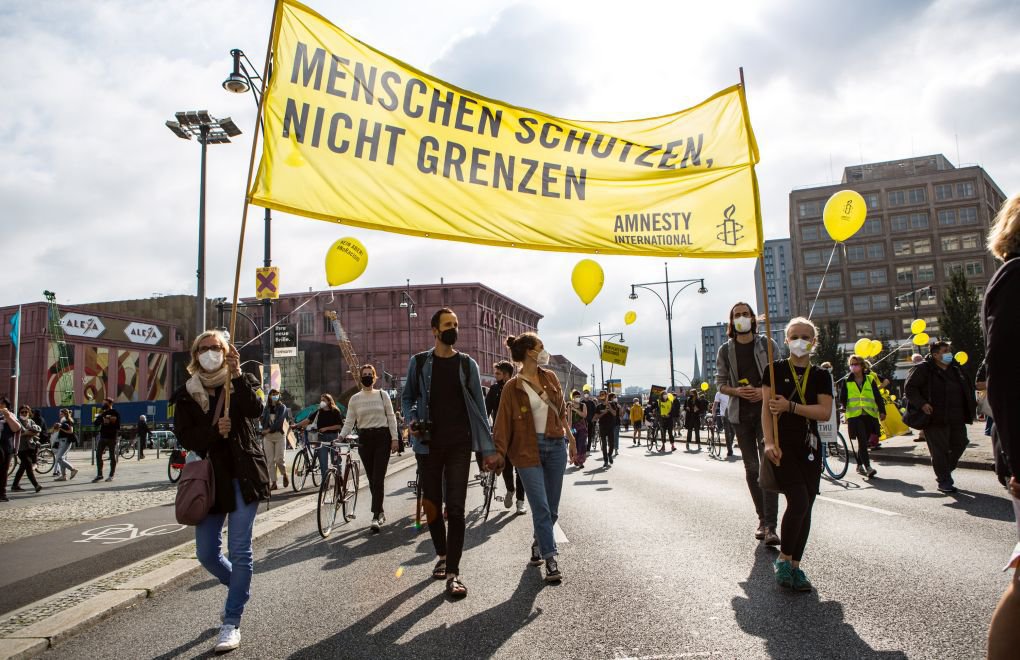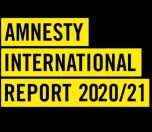* Photo: Amnesty International
Click to read the article in Turkish
Amnesty International released its annual report 2021/2022 titled "The State of the World's Human Rights" today (March 29).
Offering a detailed overview of the state of human rights in 154 countries, the report of the organization has said, "From a human rights perspective, 2021 was largely a story of betrayal in the corridors of power".
It has found that "the promises to 'build back better' after the pandemic were little more than lip service", noting that "hopes of global cooperation withered in the face of vaccine hoarding and corporate greed".
Governments suppressed independent and critical voices, with some even using the pandemic as a pretext to shrink further the civic space. New and unresolved conflicts erupted or persisted. Those forced to flee were subjected to a litany of abuses, including pushbacks by countries in the Global North. But hopes for a better post-pandemic world were kept alive by courageous individuals, social movements and civil society organizations.
The state of human rights in Turkey
Noting that "violations of rights and protests were all across Turkey" in 2021, the report has also shared observations and findings about the state of human rights and freedoms in the country. Before going into detail, the report has offered the following general commentary on Turkey:
- Deep flaws in the judicial system were not addressed.
- Opposition politicians, journalists, human rights defenders and others faced baseless investigations, prosecutions and convictions.
- Turkey withdrew from the Istanbul Convention.
- Government officials targeted LGBTI people with homophobic rhetoric.
- Freedom of peaceful assembly was severely curtailed.
- A new law unduly restricted freedom of association for civil society organizations.
- Serious and credible allegations of torture and other ill-treatment were made.
- Turkey hosted 5.2 million migrants and refugees, but thousands of asylum seekers were denied entry.
- Physical attacks against refugees and migrants increased in the context of rising anti-refugee rhetoric.
Offering some background information about the country as well, Amnesty International has indicated that "new Human Rights Action Plan and two Judicial Reform Packages prepared by the Ministry of Justice failed to address deep flaws in the judiciary".
Noting that "the Parliament extended the mandate for military operations in Syria and Iraq for another two years" in October, it has also reminded the international community that "a threat by the president to expel 10 Western ambassadors after they called for the immediate release of civil society leader Osman Kavala was withdrawn after several days".
The report has then moved on to analyze the state of human rights in Turkey under the subheadings of "state overreach", "repression of dissent", "freedom of expression", "human rights defenders", "women's and girls' rights", "LGBTI+ people's rights", "freedom of assembly", "freedom of association", "torture and other ill treatment", "enforced disappearances", "refugees' and migrants' rights". Some details are as follows:
'State overreach'
"In July, parliament approved an omnibus bill extending emergency powers for another year and allowing the dismissal of public servants, including judges and prosecutors, for having alleged links to 'terrorist' organizations without the possibility of judicial review.
'Repression of dissent'
"In January, the Ankara court accepted a 3,530-page indictment for the prosecution of 108 people, including former and present members of the HDP and its former co-leader Selahattin Demirtaş.
"The indictment contained 29 separate charges including 'intentional killing' and 'disrupting the unity and territorial integrity of the state.' They were accused of mobilizing masses to commit violence during protests on 6-8 October 2014 under the instructions of the Kurdistan Workers Party (PKK). Dubbed the 'Kobani trial', proceedings were ongoing at the end of the year.
"In April, in another case against Selahattin Demirtaş, the Court of Cassation upheld his four years and eight months' prison sentence for 'making propaganda for a terrorist organization'. In September and December, the Council of Europe's Committee of Ministers monitoring the implementation of the December 2020 Demirtaş v Turkey decision by the European Court of Human Rights (ECtHR), reiterated its call for his immediate release.
Freedom of expression
"In September, a Diyarbakır court sentenced human rights lawyer Nurcan Kaya to a suspended sentence of one year and three months' imprisonment for 'making propaganda for a terrorist organization' concerning a tweet about the Islamic State siege of Kobani in 2015.
"In October, the Malatya court sentenced Kurdish writer and Kurdish Pen member Meral Şimşek to one year and three months' imprisonment for 'making propaganda for a terrorist organization', relating to her writings, the awards she received and the content of wiretapped conversations.
In October, in the landmark decision Vedat Şorli v Turkey, the ECtHR found that Article 299 of the Criminal Code, which criminalizes insulting the president, was incompatible with the right to freedom of expression, and urged the government to align the legislation with Article 10 of the European Convention on Human Rights.
Human rights defenders
"In January, the Istanbul Regional Appeals Court overturned the February 2020 acquittals of Osman Kavala and eight other civil society figures in the Gezi Park trial.
"In December, the Council of Europe's Committee of Ministers formally notified Turkey of its intention to initiate infringement proceedings for its failure to comply with the ECtHR judgment to release Osman Kavala.
"In February, human rights lawyer and defender Eren Keskin was sentenced to six years and three months' imprisonment for 'membership of a terrorist organization' in the Özgür Gündem newspaper trial, for participating in a solidarity campaign. The case was pending appeal at the end of the year.
"The retrial of Şebnem Korur Fincancı and Erol Önderoğlu for their one-day editorial support of Özgür Gündem restarted in February after their 2019 acquittals were overturned on appeal.
"In March, Öztürk Türkdoğan, co-chair of the IHD, was arrested during a police raid in his home on suspicion of "membership of a terrorist organization". He was released the same day with judicial control measures.
Women's and girls' rights
On 20 March, by presidential decision, Turkey withdrew from the Council of Europe Convention on combating and preventing violence against women and domestic violence (Istanbul Convention), depriving women and girls of a vital instrument of protection from all forms of violence, without discrimination. The announcement coincided with a surge in domestic violence cases during the Covid-19 pandemic, and sparked countrywide protests.
"The withdrawal entered into force on 1 July. According to independent women's rights organizations, 280 women were killed during the year as a result of gender-based violence, 217 women found suspiciously dead.
LGBTI people's rights
"In a tweet in January, the minister of interior referred to four Boğazici University students as 'LGBT perverts''. He was commenting on the students' arrest in relation to a campus art exhibition depicting a religious site with symbols of the LGBTI community.
"In March, the government attempted to justify the withdrawal from the Istanbul Convention by claiming that the Convention was instrumentalized to 'normalize homosexuality' and that this was 'incompatible with Turkey's social and family values'.
Freedom of assembly
"Police used unnecessary and excessive force while detaining hundreds of students during peaceful assemblies prote"sting at the presidential appointment of Professor Melih Bulu as rector of Boğaziçi University.
"In March, the trial began of 46 individuals, including human rights defenders, political activists, journalists, and relatives of victims of enforced disappearances dubbed the 'Saturday Mothers/ People.' The defendants faced charges under the Law on Meetings and Demonstrations for refusing to disperse during their 700th weekly vigil on 25 August 2018.
"Seventeen women participating in the Night March marking International Women's Day on 8 March were detained and later released under judicial control measures for 'insulting the president' and violating the Law on Meetings and Demonstrations. In August, an Istanbul court accepted the indictment requesting that each receive up to eight years' imprisonment.
"In April, the gendarmerie responded with tear gas to a protest by villagers in İkizdere, in the province of Rize, against the decision to open a stone mine in the village which they argued would destroy the environment and pollute drinking water. Some villagers were detained and later released. Protests continued despite banning orders by the Rize Governorship.
"In June, the annual Istanbul Pride march was banned for the sixth consecutive year. Police used unnecessary and excessive force to disperse protesters and detained at least 47 people, including the journalist Bülent Kılıç. All were released later that day.
Freedom of association
The new Law on the Prevention of the Financing of the Proliferation of Weapons of Mass Destruction negatively affected the work of civil society organizations. In October, the Financial Action Task Force added Turkey to its 'gray list' for increased monitoring. It cited Turkey's failure to address serious deficiencies in its efforts to combat money laundering and financing terrorism, including its failure to apply a risk-based approach to supervision of the not-for-profit sector.
"In June, the Constitutional Court accepted the indictment by the Chief Prosecutor of the Court of Cassation requesting the closure of the HDP and a five-year political ban for its 451 executives and members.
"The HDP was accused of becoming the focus point of actions contrary to the state's integrity, based on criminal prosecutions and convictions against 520 individuals under overly broad anti-terrorism laws.
Torture and other ill-treatment
In January, a Diyarbakır criminal peace judgeship rejected an appeal by Mehmet Sıddık Meşe against the decision not to prosecute allegations that he was severely beaten by guards in Diyarbakır T-type Prison No.3 in December 2020. The Diyarbakır Bar Association received similar torture allegations from inmates of the same prison throughout the year.
"In December, Garibe Gezer, held on terrorism-related charges in Kandira prison, was found dead in an alleged suicide in her cell while in solitary confinement. She had reported being systematically tortured and sexually assaulted by prison guards prior to her death. The prosecutor's office had dismissed an investigation into the allegations.
Refugees' and migrants' rights
"According to Turkish immigration authorities, as of November Turkey hosted around 5.2 million refugees and migrants, including 3.7 million Syrians with temporary protection status.
"In July, the authorities announced the extension of the existing wall at the border with Iran. In the same month, the Van Governorship announced that 34,308 people had been prevented from entering the country at that border since January. Reports emerged that Turkey continued to push back to Iran Afghans attempting to enter the country irregularly. In August, following the Taliban takeover of Afghanistan, the Turkish authorities declared they would not allow the arrival of a large number of Afghans.
"In September, immigration authorities terminated the registration of Syrians for temporary protection in Ankara and announced the deportation of irregular migrants without protection status or residence permits.
"Violent attacks targeting Syrians increased. In August, a large crowd attacked the homes and properties of Syrians in the Altındağ district of Ankara following the fatal stabbing of a young Turkish national during a street fight between Turkish and Syrian youths." (AS/SD)





.jpg)

